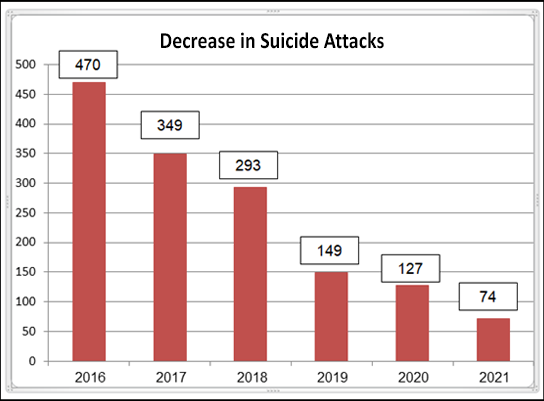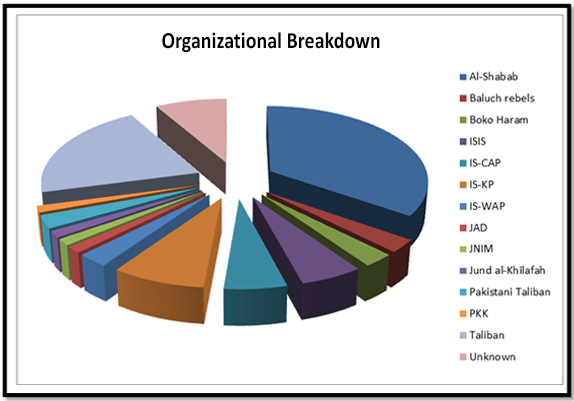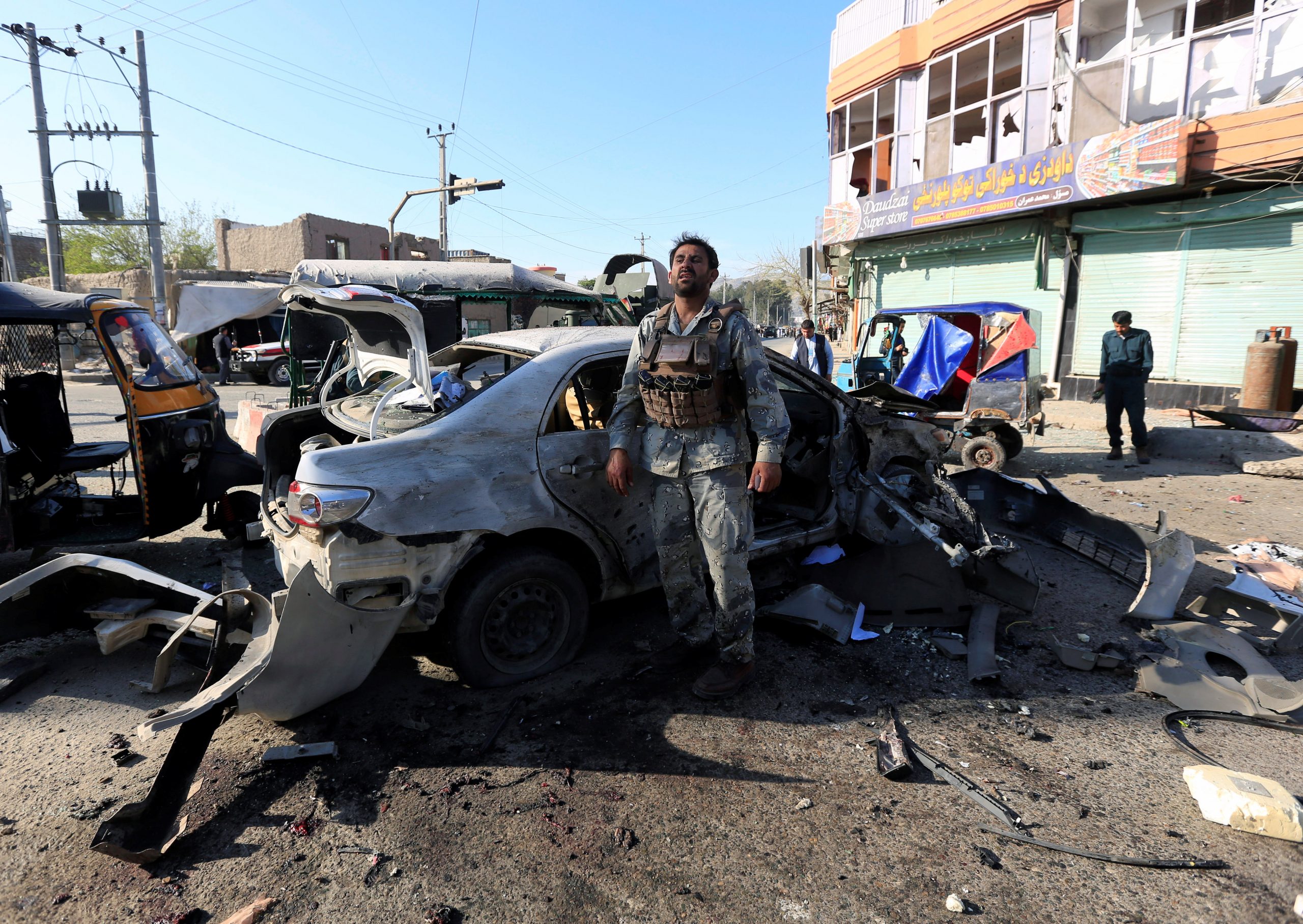Publications
INSS Insight No. 1547, January 10, 2022
Over the past five years there has been a clear downward trend in the number of suicide attacks worldwide, with a particularly sharp drop in 2021. This trend is apparently the combined result of the significant weakening of the Islamic State following its military defeat in Syria and Iraq, and the withdrawal or considerable reduction of Western military forces in combat areas in the Middle East and southern Asia. In 2021 there were about 42 percent fewer suicide attacks than in the previous year, with a 48.5 percent reduction in the number of suicide attackers, and a decrease of 69 percent in the number of women participating in such attacks. A sharp drop of 44.5 percent was recorded in the number of attacks carried out by ISIS and its affiliates, and of about 35 percent in the number of attacks carried out by supporters of al-Qaeda. In general, there was a reduction of about 44 percent in the number of attacks linked to the Salafist-jihadi stream of Islam, although organizations linked to it continued to dominate as instigators of suicide attacks.
Figures on suicide attacks are recorded on an ongoing basis by the Terrorism and Low Intensity Conflict Program at the Institute for National Security Studies (INSS), and rely on two independent sources. A combined attack on a number of adjacent targets at the same time or as the result of deliberate advance planning is counted as one attack.
In 2021 there were about 74 suicide attacks worldwide (compared to about 127 the previous year, a decrease of about 42 percent), carried out by about 91 terrorists (compared to 177 in 2020, a decrease of 48.5 percent). These attacks caused the deaths of about 805 individuals (compared to 765 in 2020), and injured another 1,482 (compared to 1,926 in 2020). However, in 2021 there was a rise in the average number of fatalities in a single attack, mainly due to the activity of Islamic State – Khorasan Province (IS-K), whose attacks were particularly lethal this year. The number of countries that suffered suicide attacks in 2021 was identical to the number recorded for the previous year, although they were not all the same countries.

For the first time, the most active arena for suicide attacks in 2021 was the African continent, with some 40 attacks (in 2020 there were about 37 attacks in Africa), constituting 54 percent of the global total. Most of them, about 24, were carried out in Somalia by the al-Shabab organization, an affiliate of al-Qaeda. The second largest number of attacks took place in Asia, and related primarily to activity in Afghanistan. In this arena there were 30 suicide attacks in 2021 (compared to 57 in the previous year, a decline of about 47.5 percent). In the Middle East there were only 3 attacks last year, compared to about 33 in 2020 – a sharp drop of 91 percent. The steep decline in the number of attacks in this arena relates to the change in the use of this mode of action by ISIS, which was the most active element in the region: in 2021 ISIS and its affiliates were responsible for about 20 suicide attacks, compared to 36 in 2020 – a drop of 44.5 percent. ISIS was responsible for 27 percent of all the attacks worldwide.
Contrary to the sharp downward trend in almost every aspect regarding suicide attacks in 2021, the average lethalness of individual attacks increased. The number of fatalities is estimated at about 805, compared to 765 in 2020 – a nominal rise of 5.5 percent. This figure represents an average of 11 deaths for each attack, compared to an average of 6 deaths in the previous year, an increase of 83 percent in average lethality per attack. On the other hand, the downward trend was retained in the number of injured, with about 1,482 victims in 2021, compared to 1,926 in 2020 (about 23 percent). However, there was a rise of about 33 percent in the average number of individuals wounded in each attack, to about 20 in 2021, compared to 15 in 2020.
The rise in the average lethality of suicide attacks in 2021 was due to the excessive lethality of Islamic State – Khorasan Province, which operates in Afghanistan. From August, when the United States withdrawal from Afghanistan was completed and the Taliban took over the country, until the end of the year, IS-K carried out 6 suicide attacks. The most deadly was the attack carried out by two suicide bombers at the entrance to Kabul Airport, where American forces were trying to control masses of Afghanis desperate to flee the Taliban government. The attack claimed 183 lives, including 13 Americans, and another 200 were injured. In all six attacks carried out by IS-K in Afghanistan in 2021, some 383 people were killed and another 513 were wounded, amounting to an average of 64 deaths and 86 wounded in each attack.

Of the some 40 suicide attacks in Africa, Somalia saw some 24 attacks, all by al-Shabab. In 2021 this organization also carried out an attack in Kenya. Another attack counted among the al-Qaeda camp attacks was carried out in Mali by JNIM - Jama'a Nusrat ul-Islam wa al-Muslimin (or “Support Group for Islam and Muslims”). In all there were four attacks in Mali, while no organization took responsibility for another three attacks, although it can be stated with certainty that they were carried out by activists from the Salafist-jihadi stream. The remaining 11 attacks on the continent were all perpetrated by ISIS: three in Nigeria, two in Libya, two in Uganda, two in the Congo, and single attacks in Tunisian and Cameroon.
The 30 suicide attacks in Asia in 2021 represent a drop of about 47.5 percent from 2020. About 27 of the Asian attacks were carried out in Afghanistan and Pakistan (compared to 55 in 2020), with a single attack each in Indonesia, Russia, and China. The drop in attacks is attributed to the end of terror activity by the Taliban, who became the ruler of the country in August 2021. The organization was responsible both directly and indirectly for some 15 attacks in 2021, the last of which took place in early August. For comparison purposes, in 2020 the Taliban were responsible for about 38 attacks, so there has been a 60.5 percent decrease. At the same time, from August to the end of the year, all the suicide attacks in the country were carried out by IS-K. In addition, in neighboring Pakistan there were 5 suicide attacks, two of them by the Pakistani Taliban, two by the Baluchi separatists against Chinese presence in the region, and one with no responsibility claimed.
Of the 3 attacks in the Middle East in 2021, one was by Kurdish rebels in Aleppo, Syria, and the other two were in carried out in Iraq by the local ISIS province.
Overall, in 2021 ISIS was directly and indirectly responsible for about 20 suicide attacks, constituting 27 percent of the global total – a drop of 44.5 percent compared to 2020, when 36 attacks were recorded, representing 28 percent of all attacks. On the other hand, al-Qaeda affiliates were responsible directly and indirectly for some 43 attacks, 58 percent of all attacks, compared to 66 attacks, or 52 percent of the total, in 2020. This represents a decline of 35 percent. In spite of the striking decrease in the number of attacks, the Salafist-jihadi stream as a whole was directly responsible for 64 attacks. It was also apparently responsible for an additional 5 attacks for which it did not claim responsibility but which, on the basis of their location and the organizations operating in the area, can be attributed to it with almost absolute certainty. According to our records, Salafist-jihadi organizations carried out 69 suicide attacks in 2021, some 93 percent of the total – a slight decrease over 2020 – while the broad assessment is that it is highly probable that they were in fact responsible for about 95 percent of attacks where the identity of the perpetrators is not known for certain. Other attacks in 2021 were carried out by separatists from Baluchistan (2), the Kurdish PKK organization in Syria (1), and two were carried out in the context of popular protests in China and Russia, with no organizational identification. There was also an attack in Britain, but at this stage it is not possible to know the motives.

In 2021 only four women were involved in suicide attacks, and their proportion of attackers, about 4.5 percent, is declining, since in 2020 they accounted for 7.5 percent and in 2019 their share was estimated as 9.5 percent. The four attacks in which women took part were in Cameroon, Tunisia, Afghanistan, and Indonesia.
In conclusion, the continuing decline in the number of suicide attacks is a further expression of the current weakness of Salafist-jihadi organizations worldwide. Although these terror organizations carry out dozens of attacks every month, their use of the suicide tactic has significantly declined. Nevertheless, it is unlikely that this type of effective and deadly action, which for many years has held religious-ethical and organizational value for them, will be completely abandoned. Changes in internal, regional, and global geopolitical circumstances could once again encourage greater use of this tactic by the organizations, to promote their objectives and specifically to establish their threatening image.
____________________________
Thanks to the team of interns in the Terror & Low Intensity Conflict program at the Institute for National Security Studies (INSS) for their contribution to this study: Gal Sagir, Lin Levy, Hila Roded, Baruch Amiel, Shahar Berdichevski, Yotam Bretler, Yuval Epstein, Amir Sivan, Matan Eblagon, Amit Ayalon, and Tali Franks.



